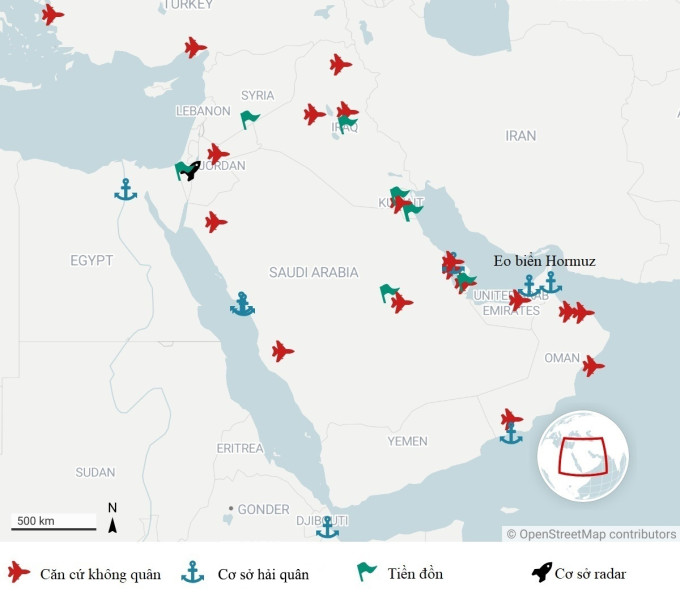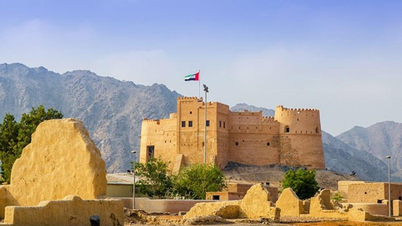If the US attacks Iran, it risks heavy retaliation from Tehran and its proxy forces, deepening the crisis in the Middle East.
The January 28 attack by an Iran-backed militia on a US military base in northeastern Jordan that killed three soldiers has sparked shock and outrage in Washington.
Asked if he would hold Iran responsible, President Joe Biden accused Tehran of “arming those who did it.” He said a decision had been made on how to respond to the attack, but did not elaborate.
Some experts and US lawmakers have called on the White House boss to put Iran on the target list.

US President Joe Biden in South Carolina on January 27. Photo: AFP
“The only thing the Iranian regime understands is force,” Republican Sen. Lindsey Graham wrote. “Attacks on American troops will continue until Iran pays the price with its own infrastructure and manpower.”
Senator Tom Cotton, a Republican, warned that if the US did not attack Iran, it would be seen as a coward, thereby "allowing Tehran to take even bolder actions".
According to them, tough US military action would hurt Iran so much that its leaders would react the way Washington wants: back down and order allied armed groups in the Middle East to stop attacking the military and US bases in the region.
However, Daniel R. DePetris and Rajan Menon, two experts from the Washington-based foreign policy research institute Defense Priorities, said this scenario has a very low probability of happening.
"Iran's response is unlikely to be what we expect," they said in an analysis on MSNBC. "Iran, angered by the US bombing, could attack US troops and bases. The US's extensive military presence in the region provides Iran with a long list of potential targets."
If Iran is attacked, it will take time to consider its options before responding, and that response may not be immediate. The roughly 45,000 US troops stationed in the Middle East would be on high alert for an extended period of time to prepare for a response. US forces in Iraq and Syria, which have been attacked more than 160 times since mid-October 2023, after the Israel-Hamas conflict erupted, would be most at risk.

US military infrastructure in the Middle East. Graphic: American Security Project
Iran's retaliation would range from ballistic missile attacks on US bases in Iraq and Syria to increased arms supplies to allied forces in the region.
The US military commander in the Middle East estimates that Iran has thousands of ballistic and cruise missiles, more than any other country in the region. They can reach major US bases, such as Al Udeid Air Base in Qatar, the US Navy's 5th Fleet in Bahrain, Al Dhafra Air Base in the United Arab Emirates (UAE) and Muwaffaq Salti Air Base in Jordan.
Iran could also retaliate in a more discreet manner, without directly confronting the US, observers say. "Traditionally, when faced with this kind of US action, Iran tends not to respond directly and immediately, but rather does so asymmetrically and over a period of time," said Ray Takeyh, a former US State Department official.
Iran's conventional military might is far inferior to that of the United States, but the network of armed groups it backs is formidable and well suited to asymmetric tactics against superior opponents.
Hezbollah in Lebanon possesses some 150,000 missiles, some of them precision-guided, capable of reaching all major cities in Israel, America's closest ally in the region.
Yemen’s Houthi group has demonstrated its determination to confront the threat by carrying out dozens of attacks on commercial vessels in the Red Sea, disrupting global supply chains. Even US warships could be targeted by Houthi anti-ship missiles.
Experts also note that Tehran has underground supporters in Europe and Latin America who could emerge in dramatic and violent ways if the United States attacks Iran.
Iran, with its proximity to the Strait of Hormuz, could also send shockwaves through the global economy . Forty percent of global crude oil passes through the strait, and with easy access, Iran could cause serious disruption to the vital shipping route.
"Those pushing for US military action against Iran were wrong to assume that Tehran would succumb to pressure from Washington. Iran's actions over the past five years have shaken that belief," DePetris and Menon noted.
When former President Donald Trump's administration withdrew from the Iran nuclear deal in 2018 and applied maximum economic pressure on the country, Tehran responded by stepping up uranium enrichment and targeting oil tankers in the Persian Gulf.
After Trump ordered the assassination of General Qassem Soleimani in January 2020, Iran used ballistic missiles to attack a US base in Iraq. And when Israel stepped up its attacks on Iranian ships at sea, Tehran copied Tel Aviv’s tactics, chasing ships owned by Israeli companies.
Hopes for a de-escalation have been raised after Kataib Hezbollah, the group believed to be behind the attack in Jordan, announced it was ceasing all military operations against the US. However, the Biden administration remains under pressure to avoid being criticized for a weak response, as the 2024 White House race is underway.
“President Biden, of course, has an obligation to respond to the deaths of three American soldiers. But those who advise him to strike Iran directly should not presume to know how Iran will respond. Nor should they assume that the consequences of Iran’s response can be predicted or managed,” DePetris and Menon stressed.
Vu Hoang (According to AFP, Reuters, MSNBC, Business Standard )
Source link






































































































Comment (0)